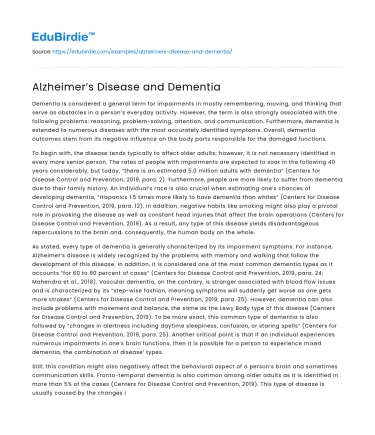Dementia is considered a general term for impairments in mostly remembering, moving, and thinking that serve as obstacles in a person’s everyday activity. However, the term is also strongly associated with the following problems: reasoning, problem-solving, attention, and communication. Furthermore, dementia is extended to numerous diseases with the most accurately identified symptoms. Overall, dementia outcomes stem from its negative influence on the body parts responsible for the damaged functions.
To begin with, the disease tends typically to affect older adults; however, it is not necessary identified in every more senior person. The rates of people with impairments are expected to soar in the following 40 years considerably, but today, “there is an estimated 5.0 million adults with dementia” (Centers for Disease Control and Prevention, 2019, para. 2). Furthermore, people are more likely to suffer from dementia due to their family history. An individual’s race is also crucial when estimating one’s chances of developing dementia, “Hispanics 1.5 times more likely to have dementia than whites” (Centers for Disease Control and Prevention, 2019, para. 12). In addition, negative habits like smoking might also play a pivotal role in provoking the disease as well as constant head injuries that affect the brain operations (Centers for Disease Control and Prevention, 2019). As a result, any type of this disease yields disadvantageous repercussions to the brain and, consequently, the human body on the whole.
Save your time!
We can take care of your essay
- Proper editing and formatting
- Free revision, title page, and bibliography
- Flexible prices and money-back guarantee
As stated, every type of dementia is generally characterized by its impairment symptoms. For instance, Alzheimer’s disease is widely recognized by the problems with memory and walking that follow the development of this disease. In addition, it is considered one of the most common dementia types as it accounts “for 60 to 80 percent of cases” (Centers for Disease Control and Prevention, 2019, para. 24; Mahendra et al., 2018). Vascular dementia, on the contrary, is stronger associated with blood flow issues and is characterized by its “step-wise fashion, meaning symptoms will suddenly get worse as one gets more strokes” (Centers for Disease Control and Prevention, 2019, para. 25). However, dementia can also include problems with movement and balance, the same as the Lewy Body type of this disease (Centers for Disease Control and Prevention, 2019). To be more exact, this common type of dementia is also followed by “changes in alertness including daytime sleepiness, confusion, or staring spells” (Centers for Disease Control and Prevention, 2019, para. 25). Another critical point is that if an individual experiences numerous impairments in one’s brain functions, then it is possible for a person to experience mixed dementia, the combination of disease’ types.
Still, this condition might also negatively affect the behavioral aspect of a person’s brain and sometimes communication skills. Fronto-temporal dementia is also common among older adults as it is identified in more than 5% of the cases (Centers for Disease Control and Prevention, 2019). This type of disease is usually caused by the changes in the brain that provoke negative alternations in the behavior of an individual (Centers for Disease Control and Prevention, 2019). In other words, people who experience fronto-temporal dementia tend to behave ridiculously and sometimes embarrassing. Overall, the most common types of this disease are Alzheimer’s, vascular, and lewy body one.
Another critical point is that abnormal changes in the human brain cause any type of dementia. Consequently, the stated alternations trigger the decrease in a person’s skills and senses crucial for maintaining a comfortable everyday life (Alzheimer’s Association, 2021). Therefore, due to the person’s ethnicity or family history, one might experience the development of the disease and, consequently, its influence on one’s brain operation. Dementia yields numerous negative consequences to the human brain, such as decreasing numbers of neurons, destroying their networks (U.S. Department of Health and Human Services, 2021). Consequently, neuron’s weakening leads to the disruption of other processes related to the impairment of a specific disease type (U.S. Department of Health and Human Services, 2021). In addition, the negative influence on various areas of the brain develops into a decrease in social behavior. In other words, dementia usually is characterized by its ability to damage not one part of the human brain but others, not necessarily related to each other.
Furthermore, the person starts experiencing impairments in numerous functions due to the brain areas being damaged. As a result, because of such a harsh influence on an individual, one might lose “the ability to live and function independently” (U.S. Department of Health and Human Services, 2021, para. 14). Overall, dementia leads to the person’s death since one can no longer function along with problems in different functions necessary for everyday life.
To sum up, numerous types of dementia are widely identified by the kind of impaired functions. Furthermore, the influence of the disease is frequently fatal to an individual as one starts experiencing a decrease in numerous brain areas leading to the inability to live independently. In other words, dementia damages innumerable parts of the human brain, worsening a person’s skills, such as thinking, mowing, communicating, and remembering.






 Stuck on your essay?
Stuck on your essay?

